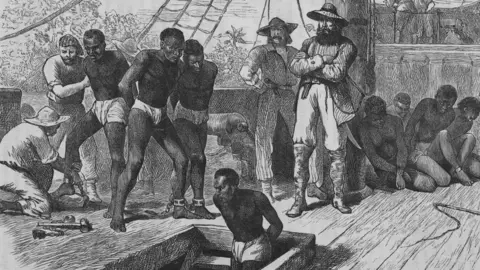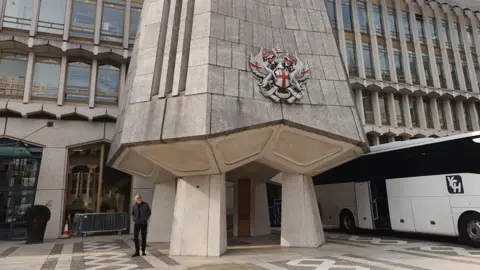Ben Lynch
LDRS
BBC

Corporation officers have written that the project will highlight "a great many connections" with the City
The governing body of London’s Square Mile is looking to commission research into its historical associations with the transatlantic slave trade.
The City of London Corporation has said the proposed work detailing its connections with the trade in enslaved African people "will enable us to understand and own our past".
The plans have been drawn up ahead of the publication by Lancaster University of its own research into the slave trade, expected in 2026.
The work, entitled the Register of British Slave Traders, will include a database showing any links with individuals and institutions.

Corporation officers have written that the project will highlight "a great many connections" with the City
The governing body of London’s Square Mile is looking to commission research into its historical associations with the transatlantic slave trade.
The City of London Corporation has said the proposed work detailing its connections with the trade in enslaved African people "will enable us to understand and own our past".
The plans have been drawn up ahead of the publication by Lancaster University of its own research into the slave trade, expected in 2026.
The work, entitled the Register of British Slave Traders, will include a database showing any links with individuals and institutions.

LDRS
The City of London Corporation says it will replicate similar investigations carried out by the Bank of England and the Church of England
Corporation officers have written in a paper that the university’s project will highlight "a great many connections" with the City.
"It will also highlight how far the financial connections of individuals across the social spectrum benefited from the trade, and how much of their investments in our key foundational systems and institutions (such as schools) came from financial rewards gained from the trade," the paper adds.
The corporation is looking to produce its own piece of research using Lancaster University’s project as a base.
The recommendation, which will go before committees, is that £34,400 be allocated to the project.
Prof William Pettigrew of Lancaster University, the principal investigator for and editor of the Register of British Slave Traders, has been lined up to complete the proposed research.
If approved, work is expected to begin in January.
'Commitment to equity'
In the corporation paper, officers referred to how other institutions with connections to the slave trade, such as the Bank of England and the Church of England, have already produced work exploring their histories.
In explaining the rationale behind the recommendation, officers wrote: “Better understanding the connections of the corporation with the trade in enslaved African people will enable us to understand and own our past."
They added: "It will enable us to develop our narrative to address our history and to devise a communication plan for our staff, members and the wider public."
A spokesperson for the City of London Corporation said: “We have a commitment to equity, equality, diversity, and inclusion, and to understanding our past."
The City of London Corporation says it will replicate similar investigations carried out by the Bank of England and the Church of England
Corporation officers have written in a paper that the university’s project will highlight "a great many connections" with the City.
"It will also highlight how far the financial connections of individuals across the social spectrum benefited from the trade, and how much of their investments in our key foundational systems and institutions (such as schools) came from financial rewards gained from the trade," the paper adds.
The corporation is looking to produce its own piece of research using Lancaster University’s project as a base.
The recommendation, which will go before committees, is that £34,400 be allocated to the project.
Prof William Pettigrew of Lancaster University, the principal investigator for and editor of the Register of British Slave Traders, has been lined up to complete the proposed research.
If approved, work is expected to begin in January.
'Commitment to equity'
In the corporation paper, officers referred to how other institutions with connections to the slave trade, such as the Bank of England and the Church of England, have already produced work exploring their histories.
In explaining the rationale behind the recommendation, officers wrote: “Better understanding the connections of the corporation with the trade in enslaved African people will enable us to understand and own our past."
They added: "It will enable us to develop our narrative to address our history and to devise a communication plan for our staff, members and the wider public."
A spokesperson for the City of London Corporation said: “We have a commitment to equity, equality, diversity, and inclusion, and to understanding our past."
148 pages
No comments:
Post a Comment